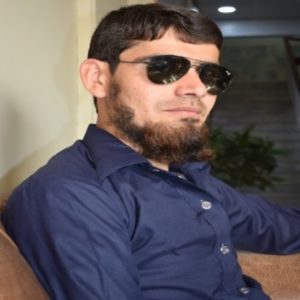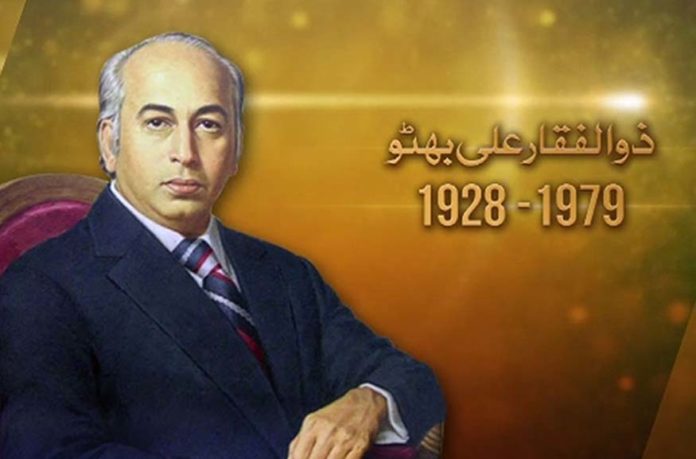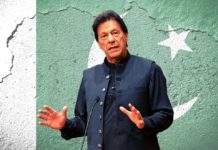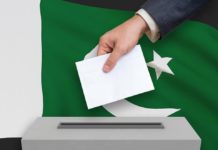Disclaimer: The Eqbal Ahmad Centre for Public Education (EACPE) encourages critical and independent thinking and believes in a free expression of one’s opinion. However, the views expressed in contributed articles are solely those of their respective authors and do not necessarily reflect the position or policy of the EACPE.
4th April, this year, marks the 40th death anniversary of Z.A. Bhutto, a historic personality and the founder of Pakistan People’s Party. He was executed by the regime of military dictator of Pakistan, Gen. Zia–ul-Haq in 1979, something which is often termed as judicial murder. Bhutto is considered to be a martyr and protector of democracy, as well asa charismatic leader who led the cause of the poor and ordinary people by raising the popular slogan of Roti, Kapra aur Makaan (bread, cloth and home). Here I will dare to disagree with this popular narrative in the light of historical evidences from the elites’ game for power and hegemony build upon the shoulders of common people using them as a tool for playing this game as articulated by famous Italian Marxist Antonio Gramsci in his writings “The Prison Notebooks”. Without going into theoretical explanation of hegemony and power game of elites, I’ll simply focus on the tactics of how the game was played.
Despite his socialist outlook with waistcoat and cap of Mao Zedong, Bhutto joined hands with feudal and religious elites.
For its better understanding, we need to keep the context of this game in mind. Bhutto emerged in a situation of crises in both West and East Pakistan during the last years of Ayub Khan’s regime and laid the foundation of Pakistan People’s Party in 1967. Mass and left wing parties usually take long to become national parties, but it is so noteworthy that the party became so popular within three years, sweeping the poles in West Pakistan in the first general elections held after three decades. Considering him the man of miracles having the stars of fate in his hands, the oppressed, repressed, suppressed and marginalized people voted for him seeking change and expecting Roti, Kapra aur Makaan. Among these supporters, young socialists were of greater concern who got attracted to Bhutto’s popular speeches. Despite his socialist outlook with waistcoat and cap of Mao Zedong, Bhutto joined hands with feudal and religious elites.
1970 polls held under Gen. Yahya’s martial law witnessed a fierce contest between Bhutto’s Pakistan People’s Party and Sheikh Majibur Rahman’s Awami League. Majib swept in East Pakistan, whereas Bhutto won partly in West Pakistan. These results were perturbing for Yahya, who earlier assessed that no party would take a clear lead. Both Butto and Yahya didn’t want Awami League to form government, something that caused a great unrest in East Pakistan. Finally, military elite favored Bhutto. Majib was deprived of the power shifting that resulted in Bengali nationalism. The unrest escalated into the call for independence, and repression of Bengalis ultimately resulted in the fall of Dhaka. Two Nation Theory suffered failure and a new state of Bangladesh came into being. This was the time when Bhutto was there in UN participating in discussions on Bengalis split. After UN, Bhutto went to America and met with President Richard Nixon and US Secretary of State William Pierce Rogers for getting clearance. He was invited by military for the rule. It’s a brief story of Bhutto’s game, rising to the power with the back of military.
Having an elitist nature he did little for the masses and more for the military elite, yet he was not spared by the military regime.
After coming in power Bhutto did less to fulfill his promise with the poor and started suppression of the labour movement and students’ movement. Young socialists like Dr. Mubashir Hassan, Jalaludin Abdur Rahim and Khurshid Hasan Mir etc. were expelled from the party as they were opposing Bhutto’s policies. His role in Operation Gibraltar and later in Dhaka fall is shameful. Moreover, his nationalization policy, second amendment in the constitution, looking for strategic depth in Afghanistan and execution of military operation in Balochistan are other troubled areas of his legacy. Moreover, despite having mass support and political legitimacy, Bhutto failed to bring military to the lines of civilian supremacy. Having an elitist nature he did little for the masses and more for the military elite, yet he was not spared by the military regime.
To conclude, we can say that Bhutto was an elite and a representative of bourgeoisie class who made alliances with other elites for creating hegemony over the masses by using a populist slogan of Roti, Kapra aur Makaan. He played the game as long as the stakeholders wanted him to play and later he was removed when he was no longer needed.
Fast forward to 2019: PTI has been ruling party under the command of charismatic Imran Khan. There’s another popular slogan of change and corruption free Pakistan – Naya Pakistan – something that masses have welcome. While keeping history in mind, one wishes that things go well for Pakistan and the hope that people voted for doesn’t end in vain.
 The writer is an M Phil student and researcher at National institute of Pakistan studies, Quaid-i-zam University, Islamabad. He can be reached at ziaullahkhan908@gmail.com
The writer is an M Phil student and researcher at National institute of Pakistan studies, Quaid-i-zam University, Islamabad. He can be reached at ziaullahkhan908@gmail.com



 The writer is an M Phil student and researcher at National institute of Pakistan studies, Quaid-i-zam University, Islamabad. He can be reached at ziaullahkhan908@gmail.com
The writer is an M Phil student and researcher at National institute of Pakistan studies, Quaid-i-zam University, Islamabad. He can be reached at ziaullahkhan908@gmail.com



